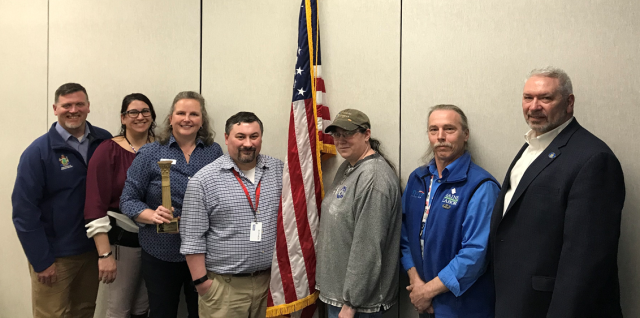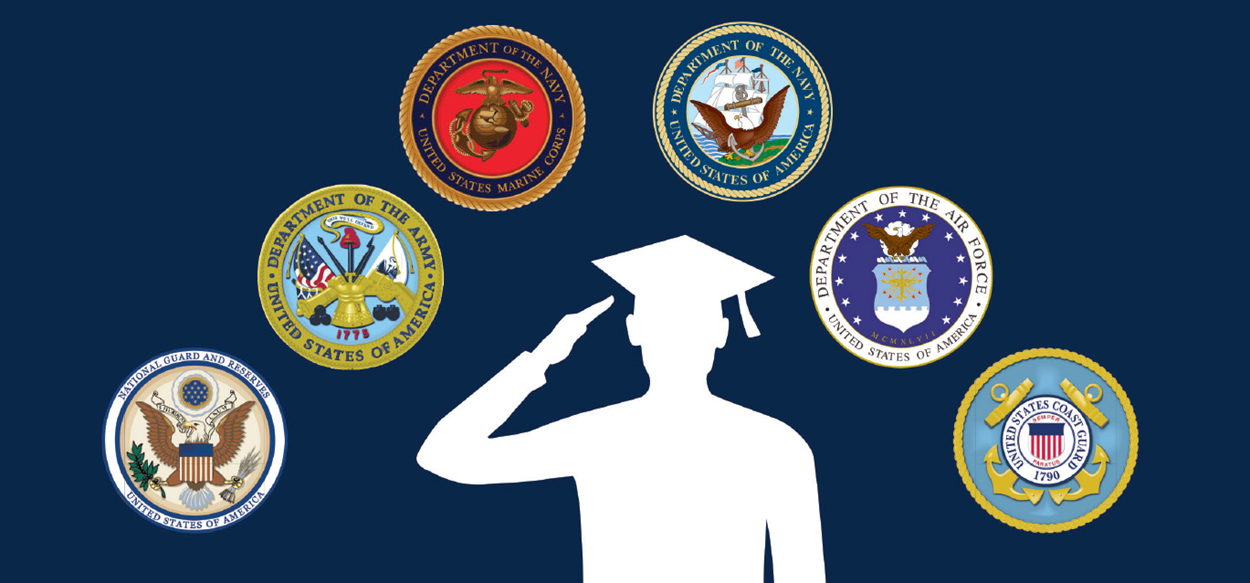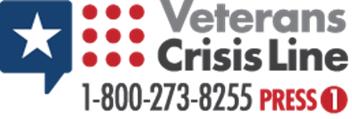A message from the Maine Bureau of Veterans' Services
 |
|
|
|
|
Maine Bureau of Veterans' Services Receives Third National Award
 On Monday, February 24th, the Maine Bureau of Veterans’ Services (MBVS) received the 2020 Abraham Lincoln Pillar of Excellence Award for Innovative State Programs from the U.S. Department of Veterans Affairs (VA).
Since 2011, the VA has recognized its state partners for programs and initiatives that support veterans in their respective states. The award was presented to MBVS Director, David A. Richmond by VA Secretary, Robert Wilkie at the 2020 National Association of State Directors of Veterans Affairs (NASDVA) Mid-Winter Conference held in Alexandria, VA.
MBVS Director Richmond shared the following regarding the significance of the recognition:
“The Bureau is truly honored to be recognized with this award, but it’s certainly a shared success story. This initiative was a collaborative effort with our partner agencies, all of whom share a goal of working together to find ways to improve advocacy to incarcerated veterans. This program turned into a statewide network that has not only benefited justice-effected veterans, but the veteran correction officers who oversee them.”
“MJAC has changed the way incarcerated veterans are viewed and their cases are handled. It has made great strides in improving access to veterans’ advocates, information, and services. It is MJAC’s stance that we have a duty to serve all veterans with the same level of respect and we do all that we can to prepare transitioning veterans to succeed after their incarceration.”
This year’s award is in recognition of the Bureau’s creation of the Maine Justice Action Committee (MJAC), which connects incarcerated veterans and veteran corrections staff to needed services. This is the Maine Bureau of Veterans’ Services third consecutive Pillar of Excellence Award, having been recognized previously for its veteran suicide prevention efforts in 2018, and work to end veteran homelessness in 2019.
In March of 2019, the Bureau co-founded MJAC with the Maine Department of Corrections (MDOC) Veterans’ Pod staff, VA Incarcerated Veterans Coordinator, VA Veteran Justice Outreach Specialist, Easterseals Maine, and Preble Street. The Committee had three goals:
1. Improve communications between agencies;
2. Standardize intake procedures for veterans who are justice involved; and
3. Utilize Skype technology to improve incarcerated veterans’ access to MBVS’ Veterans Service Officers.
“This is fantastic news,” said Randall Liberty, Commissioner of the Maine Department of Corrections. “Agencies across Maine continue to work together in order to connect veterans with valuable resources, and I couldn’t be happier with the collaboration that’s happening on behalf of Maine veterans.”
MJAC quickly expanded to include new members and started to collaborate with the Maine Correctional Center, Southern Maine Women’s Re-entry Center, Mountain View Correctional Facility, Bolduc Correctional Facility, Maine Coastal Regional Re-Entry Center, the Penobscot Nation Judicial System’s Healing to Wellness Court, Wabanaki Health and Wellness, the Maine Department of Labor and its Career Centers, Veterans’ Treatment Court, Veteran Mentors of Maine, Veterans Upward Bound, Maine State Approving Agency for Veterans’ Education Programs, the Small Business Association of Maine, the Maine Prisoner Re-Entry Network, Destination Occupation, K-9s on the Frontlines, the Kennebec County Sheriff’s Department and its Veterans’ Pod, and the Maine Arts Commission.
Interactions with these additional agencies led to the creation of a welcome packet for new veteran hires at the Maine Department of Corrections, re-entry resource fairs for incarcerated veterans and corrections staff, the updating and sharing of a master list identifying businesses willing to hire ex-felons to help improve their transition back into the workforce; connection made between Veterans’ Treatment Court and the Penobscot Nation Judicial System’s Healing to Wellness Court for Native American Veteran referrals, introduction to VA Veteran Justice Outreach Specialists, and an invitation to participate in 2020 court trainings; the creation of a K-9 companion training program at the Southern Maine Women’s Re-entry Center; discussions of ways to improve the re-entry process back into the community and the creation of apprenticeship programs for veteran inmates; the Veterans’ Writing Group at the Kennebec County Jail which led to submissions of poetry and short stories to the PEN 2019 Prison Writing Contest and one inmate/veterans’ artwork being chosen by the Maine Arts Commission to be hung in the 2019 Veterans’ Art Show, and ongoing discussions to create small houses for homeless veterans through the MDOC’s building construction and furniture making programs.
With six field offices located across the state, and a claims office at the VA Maine Healthcare System at Togus, our Veteran Service Officers stand ready to connect with veterans from all branches and every period of service. MBVS is committed to serving our veteran population in the most efficient and respectful manner possible, and MJAC is another resource connecting Maine veterans to needed services.
For more information on the Maine Bureau of Veterans’ Services, or to contact the Veteran Service Office nearest you, please visit: www.maine.gov/veterans/ or call 207-430-6035.
On Monday, February 24th, the Maine Bureau of Veterans’ Services (MBVS) received the 2020 Abraham Lincoln Pillar of Excellence Award for Innovative State Programs from the U.S. Department of Veterans Affairs (VA).
Since 2011, the VA has recognized its state partners for programs and initiatives that support veterans in their respective states. The award was presented to MBVS Director, David A. Richmond by VA Secretary, Robert Wilkie at the 2020 National Association of State Directors of Veterans Affairs (NASDVA) Mid-Winter Conference held in Alexandria, VA.
MBVS Director Richmond shared the following regarding the significance of the recognition:
“The Bureau is truly honored to be recognized with this award, but it’s certainly a shared success story. This initiative was a collaborative effort with our partner agencies, all of whom share a goal of working together to find ways to improve advocacy to incarcerated veterans. This program turned into a statewide network that has not only benefited justice-effected veterans, but the veteran correction officers who oversee them.”
“MJAC has changed the way incarcerated veterans are viewed and their cases are handled. It has made great strides in improving access to veterans’ advocates, information, and services. It is MJAC’s stance that we have a duty to serve all veterans with the same level of respect and we do all that we can to prepare transitioning veterans to succeed after their incarceration.”
This year’s award is in recognition of the Bureau’s creation of the Maine Justice Action Committee (MJAC), which connects incarcerated veterans and veteran corrections staff to needed services. This is the Maine Bureau of Veterans’ Services third consecutive Pillar of Excellence Award, having been recognized previously for its veteran suicide prevention efforts in 2018, and work to end veteran homelessness in 2019.
In March of 2019, the Bureau co-founded MJAC with the Maine Department of Corrections (MDOC) Veterans’ Pod staff, VA Incarcerated Veterans Coordinator, VA Veteran Justice Outreach Specialist, Easterseals Maine, and Preble Street. The Committee had three goals:
1. Improve communications between agencies;
2. Standardize intake procedures for veterans who are justice involved; and
3. Utilize Skype technology to improve incarcerated veterans’ access to MBVS’ Veterans Service Officers.
“This is fantastic news,” said Randall Liberty, Commissioner of the Maine Department of Corrections. “Agencies across Maine continue to work together in order to connect veterans with valuable resources, and I couldn’t be happier with the collaboration that’s happening on behalf of Maine veterans.”
MJAC quickly expanded to include new members and started to collaborate with the Maine Correctional Center, Southern Maine Women’s Re-entry Center, Mountain View Correctional Facility, Bolduc Correctional Facility, Maine Coastal Regional Re-Entry Center, the Penobscot Nation Judicial System’s Healing to Wellness Court, Wabanaki Health and Wellness, the Maine Department of Labor and its Career Centers, Veterans’ Treatment Court, Veteran Mentors of Maine, Veterans Upward Bound, Maine State Approving Agency for Veterans’ Education Programs, the Small Business Association of Maine, the Maine Prisoner Re-Entry Network, Destination Occupation, K-9s on the Frontlines, the Kennebec County Sheriff’s Department and its Veterans’ Pod, and the Maine Arts Commission.
Interactions with these additional agencies led to the creation of a welcome packet for new veteran hires at the Maine Department of Corrections, re-entry resource fairs for incarcerated veterans and corrections staff, the updating and sharing of a master list identifying businesses willing to hire ex-felons to help improve their transition back into the workforce; connection made between Veterans’ Treatment Court and the Penobscot Nation Judicial System’s Healing to Wellness Court for Native American Veteran referrals, introduction to VA Veteran Justice Outreach Specialists, and an invitation to participate in 2020 court trainings; the creation of a K-9 companion training program at the Southern Maine Women’s Re-entry Center; discussions of ways to improve the re-entry process back into the community and the creation of apprenticeship programs for veteran inmates; the Veterans’ Writing Group at the Kennebec County Jail which led to submissions of poetry and short stories to the PEN 2019 Prison Writing Contest and one inmate/veterans’ artwork being chosen by the Maine Arts Commission to be hung in the 2019 Veterans’ Art Show, and ongoing discussions to create small houses for homeless veterans through the MDOC’s building construction and furniture making programs.
With six field offices located across the state, and a claims office at the VA Maine Healthcare System at Togus, our Veteran Service Officers stand ready to connect with veterans from all branches and every period of service. MBVS is committed to serving our veteran population in the most efficient and respectful manner possible, and MJAC is another resource connecting Maine veterans to needed services.
For more information on the Maine Bureau of Veterans’ Services, or to contact the Veteran Service Office nearest you, please visit: www.maine.gov/veterans/ or call 207-430-6035.
Veterans’ GI Bill benefits to continue during COVID-19 pandemic

On March 21, a bill enabling the Department of Veterans Affairs (VA) to continue providing the same level of education benefits to students having to take courses online due to the coronavirus (COVID-19) outbreak was signed into law.
The law gives VA temporary authority to continue GI Bill payments uninterrupted in the event of national emergencies, allowing for continued payment of benefits even if the program has changed from resident training to online training.
Thanks to the law, GI Bill students will continue receiving the same monthly housing allowance payments they received for resident training until December 21, 2020 or until the school resumes in-person classes.
For more information, please visit the VA's website.
Taking Care of Your Behavioral Health
‘FACE COVID’
How to respond effectively to the Corona crisis by:
Dr Russ Harris, author of The Happiness Trap
‘FACE COVID’ is a set of practical steps for responding effectively to the Corona crisis, using the principles of acceptance and commitment therapy (ACT).
Here’s a quick summary of the key steps:
F = Focus on what’s in your control
A = Acknowledge your thoughts & feelings
C = Come back into your body
E = Engage in what you’re doing
C = Committed action
O = Opening up
V = Values
I = Identify resources
D = Disinfect & distance
Let’s now explore these, one by one:
F = Focus on what’s in your control
The Corona crisis can affect us in many different ways: physically, emotionally, economically, socially, and psychologically. All of us are (or soon will be) dealing with the very real challenges of widespread serious illness and the inabilities of healthcare systems to cope with it, social and community disruption, economic fallout and financial problems , obstacles and interruptions to many aspects of life … and the list goes on.
The more we focus on what’s not in our control, the more hopeless or anxious we’re likely to feel. So the single most useful thing anyone can do in any type of crisis – Corona-related or otherwise - is to: focus on what’s in your control.
You can’t control what happens in the future. But you can control what you do - here and now. And that matters.
A = Acknowledge your thoughts and feelings
Silently and kindly acknowledge whatever is ‘showing up’ inside you: thoughts, feelings, emotions, memories, sensation, urges. Take the stance of a curious scientist, observing what’s going on in your inner world.
And while continuing to acknowledge your thoughts and feelings, also ....
C = Come back into your body
Come back into and connect with your physical body. Find your own way of doing this. You could try some or all of the following, or find your own methods:
• Slowly pushing your feet hard into the floor.
• Slowly straightening up your back and spine; if sitting, sitting upright and forward in your chair.
• Slowly pressing your fingertips together
• Slowly stretching your arms or neck, shrugging your shoulders.
• Slowly breathing
E = Engage in what you’re doing
Get a sense of where you are and refocus your attention on the activity you are doing.
Find your own way of doing this. You could try some or all of the following suggestions, or find your own methods:
• Look around the room and notice 5 things you can see.
• Notice 3 or 4 things you can hear.
• Notice what you can smell or taste or sense in your nose and mouth
• Notice what you are doing
• End the exercise by giving your full attention to the task or activity at hand. (And if you don’t have any meaningful activity to do, see the next 3 steps.)
Ideally, run through the ACE cycle slowly 3 or 4 times, to turn it into a 2- 3 minute exercise.
C = Committed Action
You may want to consider physical exercise to stay fit, cooking (as) healthy food (as possible, given restrictions), and doing meaningful activities by yourself or with others.
O = Opening Up
‘In event of an emergency, put on your own oxygen mask before assisting others.’ Well, self-kindness is your own oxygen mask; if you need to look after others, you’ll do it a whole lot better if you’re also taking good care of yourself.
V = Values
How do you want to treat yourself and others? Your values might include love, respect, humour, patience, courage, honesty, caring, openness, kindness …. or numerous others. Look for ways to ‘sprinkle’ these values into your day.
I = Identify resources
Identify resources for help, assistance, support, and advice. This includes friends, family, neighbors, health professionals, emergency services. And make sure you know the emergency helpline phone numbers, including psychological help if required.
D = Disinfect & distance physically
I’m sure you already know this, but it’s worth repeating: disinfect your hands regularly and practice as much social distancing as realistically possible, for the greater good of your community. And remember, we’re talking about physical distancing – not cutting off emotionally.
In Summary, as problems pile up in the world around you, and emotional storms rage in the world within you, come back to the steps of FACE COVID:
F = Focus on what’s in your control A = Acknowledge your thoughts and feelings C = Come back into your body E = Engage in what you’re doing C = Committed action O = Opening up V = Values I = Identify resources D = Disinfect & distance
Maine's Recreational Fishing Season Is Now Open
Encouraging Mainers to enjoy the outdoors as we confront the challenges associated with COVID-19, Governor Mills has directed the Maine Department of Inland Fisheries and Wildlife to open all inland waters for fishing and to waive the requirement that anglers need a recreational fishing license to fish those waters until April 30th.
Getting outside and accessing these recreational opportunities is a great way to practice social distancing, while at the same time reaping the mental health benefits of being outdoors.
For more information, please visit the Department of Inland Fisheries & Wildlife's website.

|
|
|
|
|
| |
|
|